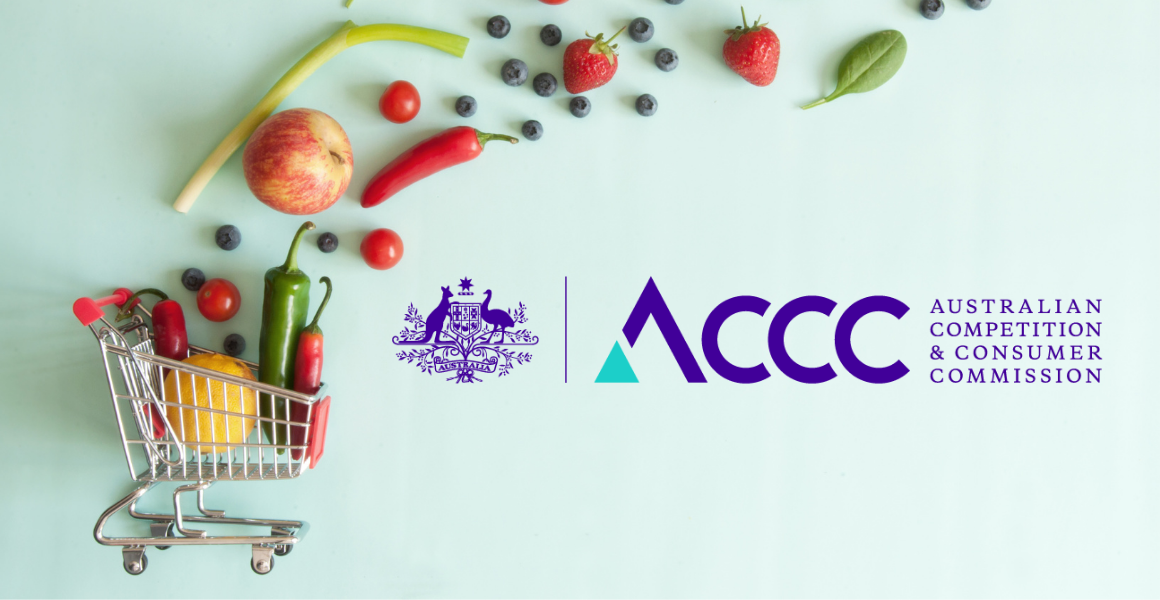
AFGC Call To Action
28 November 2023
Federal Pre-Budget Submission
19 December 2023
Mr Chris Leptos AO, Independent Reviewer of the Food & Grocery Code. Source: Food and Grocery Code Reviewer.
Independent Reviewer’s Annual Report into the Australian Food & Grocery Code
According to a report recently released by the Independent Reviewer of the Food and Grocery Code, fruit and vegetable suppliers have expressed that Australian retailers have treated them unreasonably and many are afraid of retribution or losing business if they complain.
The 2022-23 Annual Report of the Independent Reviewer of the Food and Grocery Code summarises the issues and complaints about retailer behaviour raised by suppliers, and includes annual survey results.
However, despite a wide range of concerns often shared within industry, the Independent Reviewer received zero official complaints between 2022 and 2023. In fact, barely any reports have been made since his appointment in 2021.

Number and nature of formal complaints made by suppliers to the Code Arbiter from 2020 to 2023. Source: 2022-23 Annual Report of the Independent Reviewer of the Food and Grocery Code.
Instead, the Annual Report survey reveals suppliers are often afraid of retribution by retailers if they raise a complaint.
Fruit and vegetable suppliers were among the most concerned, with 53 percent saying they feared damaging their commercial relationship if they raised an issue with retail buyers, and 23 percent saying they feared retribution from those retailers.
Twenty six percent of fruit and vegetable suppliers reported to the survey that in dealings with retailers’, they “act unreasonably at times” or “frequently act unreasonably or with duress”.
Many fruit and vegetable suppliers are being faced with unreasonable dealings by the retailers, but are afraid that if they raise a complaint through the system meant to help them, they will be blacklisted by the small number of retailers that control the Australian market.

Fear of retribution when raising issues with retailer buying team. Source: 2022-23 Annual Report of the Independent Reviewer of the Food and Grocery Code.
Fruit and vegetable suppliers indicated they had the most difficulty negotiating price rise requests with retailers, in comparison to all other industries surveyed, with 30 percent finding it ‘challenging’ and 17 percent finding it (overly) ‘involved’.
One hundred percent of fruit and vegetable suppliers indicated that when raising an issue with their retailer buying team, it was not resolved satisfactorily.

Percentage of suppliers who consider their issues was satisfactorily assessed by the buying team. Source: 2022-23 Annual Report of the Independent Reviewer of the Food and Grocery Code.
AUSVEG welcomes that Code Arbiters have reported a significant increase in the volume of enquiries and supplier complaints raised with them which is potentially reflective of the Arbiters discussing concerns with suppliers without instigating a more formal complaint process. However 50 percent of fruit and vegetable suppliers stated that they don’t know who their retailer’s Code Arbiter is, nor how to contact them, and for those that did raise a concern, 100 percent indicated that it was not satisfactorily addressed.
Disappointingly, fruit and vegetable suppliers had the worst response across all industries surveyed when questioned as to whether retailers deal in good faith toward them, with 26 percent indicating ‘sometimes’ or ‘rarely’, and only 37 percent indicating ‘always’.

Percentage of suppliers who believe that retailers deal in good faith towards them. Source: 2022-23 Annual Report of the Independent Reviewer of the Food and Grocery Code.
This year, the Independent Reviewer has created a dashboard making it easier to view the survey results. View the dashboard, and more information on the Annual Report, on the Grocery Code Reviewer website.

Report on National Food Security released
AUSVEG welcomes the Australian Food Story: Feeding the Nation and Beyond report into food security in Australia, and commends the House Standing Committee on Agriculture on its comprehensive investigation into the vulnerability of food supply systems in Australia.
The recommendations of the Committee reflect many of AUSVEG’s key policy positions particularly around developing a national food plan, and addressing some of the key issues such as sovereign capability, labour shortages, vegetable consumption and biosecurity.
“Given the diversity of issues that farmers face across environment, workforce, competition, and other areas, a Minister for Food could provide an overarching mechanism to progress some key priorities, that are otherwise difficult to get traction on,” Michael Coote, CEO, AUSVEG.
“Australian vegetable growers provide more than 98 percent of the fresh vegetables sold in Australia. If we want to preserve Australia’s supply of fresh, high quality, safe produce, we must ensure some of the key barriers to long term sustainability of the industry are removed”.
A survey AUSVEG undertook in June this year indicated that 34 percent of growers were considering exiting the industry due to issues such as workforce shortages, growing input costs, and reduced margins.
This report recognises these issues and AUSVEG looks forward to further analysing the report and working with Government to implement some of the recommendations that will have a tangible economic benefit to the industry.

Competition Roundtable with Assistant Minister for Competition
Earlier this week AUSVEG participated in the Competition roundtable hosted by the National Farmers’ Federation with Assistant Minister for Competition Andrew Leigh.
The meeting was very timely with the establishment of the Senate Inquiry in to Supermarket Pricing scheduled to commence in early 2024 and the ongoing review of the Federal Government’s competition policy.
Key issues discussed at the roundtable included:
- Greater powers to the ACCC, including additional funding to boost resourcing capability
- Industry Codes of Conduct, in particular the Australian Food & Grocery Code
- Price transparency across the supply chain
- Unfair trading practices
Nearly all sectors of agriculture are experiencing frustrations at the lack of transparency along the supply chain, and the often substantial price differential between farm gate price and what consumers pay.
Australian Food & Grocery Code of Conduct Review
The Australian Food and Grocery Code of Conduct (AFGC) is a prescribed voluntary code under the Competition and Consumer Act 2010.
The Code was introduced to improve transparency and certainty in the commercial dealings between retailers, wholesalers and suppliers, and provide an effective process for parties to resolve their disputes.
The AFGC is scheduled to be automatically repealed on 1 April 2025. Prior to this, a Review of the Code is required to determine whether it remains fit for purpose.
A Review into the dispute resolution provisions (Part 5 of the Code) was conducted earlier this year and the report is now with the Government for consideration.
Feedback from growers in regards to the upcoming Review indicates the key reforms could include the Code becoming mandatory, penalties for breaches, fairer trading practices to provide greater equity in the grower-retailer relationship, better education opportunities for suppliers on understanding the Code and their rights, and to introduce independent arbitration, and greater price transparency.
AUSVEG is waiting for the consultation period to open for the Review, with the final report due by June 2024.
Treasury has advised that the Review will undertake two key activities:
- Assess the effectiveness of the Code provisions in achieving the purpose of the Code to improve the commercial relationship between retailers, wholesalers and suppliers in the grocery sector, and
- Consider the need for the Code, including whether it should be remade, amended or repealed.
In evaluating the purpose and features of the Code, the Review will have particular regard to:
- The impact of the Code in improving commercial relations between grocery retailers, wholesalers and suppliers;
- Whether the Code’s provisions should be extended to other retailers or wholesalers operating in the food and grocery sector;
- Whether the Code should be made mandatory; and
- Whether the Code should include civil penalty provisions.
AUSVEG will be preparing a submission into the AFGC Review.
In preparation, we are seeking detailed information from the vegetable, potato and onion sector on their experiences dealing with retailers, and how the Code be modified to ensure a more even playing field.
Some suggestions already under consideration by AUSVEG for the submission include:
- Making the AFGC mandatory rather than voluntary.
- Enabling greater equity around the weekly price negotiations for perishable goods.
- Replacing supply agreements with greater contractual certainty, including price.
- Implementing fines and financial penalties for those businesses or individuals that breach the AFGC, including mechanisms to compensate disadvantaged suppliers.
- Appointing Code Arbiters independent of the retailers.
- Access to education and training for industry to better understand the AFGC, and assist in levelling the playing field.
- Enable mechanisms that require increased transparency and reporting from retailers.
We encourage you to contribute by:
1. Sharing your story
Please write to publicaffairs@ausveg.com.au with case studies and examples that we can use to support necessary changes to the AFGC.
AUSVEG will work with growers to ensure anonymity whilst maintaining the rigour of the information.
2. Providing evidence
To support your feedback, please provide data or documents (i.e. emails) as evidence surrounding the concerns with the AFGC.
AUSVEG has engaged commercial lawyers to review current trading supply arrangements and commitments, and is also collating data from grower discussions in relation to long-term price trends, supply arrangements, margin markups and retailer behaviour complaints.

Retail Negotiation with Neil Rechlin
Most growers are very good at negotiating the price of farm equipment and understanding the latest technology. However, it is often not the case when dealing with retailers. Effective engagement will ensure growers get a fairer return for their hard work to grow fresh produce.
AUSVEG, in partnership with NextGen, recently conducted a training course in Melbourne for growers to learn retailer negotiation skills.
Presenter Neil Rechlin says that many growers receive the contract details from the retailer, but often don’t understand them, or the strategy that underpins the discussion. To be in a better position, grower knowledge of what drives retailer behaviour and their tactics goes a long way to improving the outcome for the grower.
Neil says there is consistent poor behaviour from retailers because they face no punishment, and no consequences. The ability to police and fine retailers for poor behaviour would be a significant step forward that can only be achieved through making the Food and Grocery Code of Conduct mandated. Under the legal framework, the current voluntary code does not allow for fines to be levied against retailers for a breach.
“It really does come down to the supplier understanding where they can benefit, what the change of behaviour from their trading partnership should look like, and then being in the position to start enforcing that. Many fear upsetting the retailer and pushing their rights too far and risking the contract.”
For the past seven years Neil has led the NextGen involvement in the Grocery Code of Conduct, working with manufacturers, industry bodies and the ACCC to continue the evolution of the Code in Australia. Neil has a passion for helping suppliers in their sometimes challenging engagements, with the major retailers and wholesalers.
Retail Negotiation Skills Workshops
To expand your skills in managing commercial sales relationships with retailers, AUSVEG is hosting two-day Retail Negotiation Skills Workshops in 2024, in collaboration with NextGen‘s Neil Rechlin.
The upcoming events will take place as follows:
BRISBANE, 13 & 14 February 2024 – Venue TBC
PERTH, 18 & 19 March 2024 – Venue: VegetablesWA, West Perth
TASMANIA, 9 & 10 April 2024 – Venue: TFGA, Longford
ADELAIDE, 2 & 3 May 2024 – Venue TBC
Cost: $1,350 per person, plus GST.
Catering: Tea and coffee will be provided.
Course details: Negotiating Value Flyer.
Please indicate your Expression of Interest by emailing AUSVEG at publicaffairs@ausveg.com.au. Don’t forget to include which event you are interested in attending.
Senate Inquiry into Supermarket Price Gouging
Last weekend the Greens launched a Senate Inquiry into Supermarket Price Gouging amid Australia’s cost of living crisis which passed through Parliament this week. The Senate Committee will inquire into and report on the price setting practices and market power of major supermarkets.
AUSVEG is pleased to see that the inquiry’s Terms of Reference include addressing ‘frameworks to protect suppliers when interacting with the major supermarkets’, and hope that the inquiry will fairly address the power imbalance across the supply chain. Whilst putting price gouging into the spotlight, it is imperative that markups made by retailers are also investigated, with the industry calling for greater price transparency.
AUSVEG would also like to see the supply agreements of retailers called in to question, with concerns by growers that retailers are potentially distorting the markets through inflated forecast weekly volumes, causing oversupply. waste, and unnecessary production costs.
AUSVEG will be making a submission to the Inquiry when it opens for consultation, with the final report due to be presented by the Senate Committee by 7 May 2024.
The Inquiry will focus on:
- the effect of market concentration and the exercise of corporate power on the price of food and groceries;
- the pattern of price setting between the two major supermarket chains;
- rising supermarket profits and the large increase in price of essential items;
- the prevalence of opportunistic pricing, price mark-ups and discounts that are not discounts;
- the contribution of home brand products to the concentration of corporate power;
- the use of technology and automation to extract cost-savings from consumers and employees;
- improvements to the regulatory framework to deliver lower prices for food and groceries;
- frameworks to protect suppliers when interacting with the major supermarkets;
- the role of multinational food companies in price inflation; and
- any other related matters.

